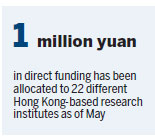SAR's sci-tech sector gets a timely boost
Updated: 2018-08-30 05:54
By He Shusi in Hong Kong(HK Edition)
|
|||||||
The central government's latest policies to strengthen cooperation between scientists in Hong Kong and on the Chinese mainland are set to utilize the city's unique advantages, unleash its potential in scientific research and help develop the Guangdong-Hong Kong-Macao Greater Bay Area into a global innovation and technology hub, leading scientists in Hong Kong say.
Neuroscientist Nancy Ip Yuk-yu, vice-president for research and graduate studies at the Hong Kong University of Science and Technology, said these favorable policies demonstrate the central government's recognition of and strong support for the special administrative region's development in science and technology.
Structural biologist Zhang Mingjie, chair professor at the Division of Life Science at HKUST, expressed similar views, saying Hong Kong maintains a unique status under "one country, two systems", which gives it an edge over mainland cities in international relations.

"This will help Hong Kong play a leading role in innovation and technology development in the Bay Area," he said.
Chan Ching-chuen, honorary professor at the Department of Electrical and Electronic Engineering at the University of Hong Kong, agreed.
He said closer ties with the mainland are conducive to promoting the transformation and application of Hong Kong's scientific research achievements.
Their response followed the first plenary meeting of the leading group for development of the Bay Area held in Beijing on Aug 15.
Vice-Premier Han Zheng heads the group, with the two chief executives of the Hong Kong and Macao SARs as members. At the meeting, Han stressed that development of the Bay Area must make full use of the advantages of the "one country, two systems" principle and unleash the integrated power of Guangdong province and the two SARs.
Following the meeting, Chief Executive Carrie Lam Cheng Yuet-ngor announced that the Chinese Academy of Sciences will set up a research institution at Hong Kong Science Park, which will focus on two areas - healthcare technologies, and artificial intelligence and robotics technologies.
Noting that the CAS is the nation's top scientific research institution, Ip said the new institute can facilitate further breakthroughs in these areas. The neuroscientist noted that Hong Kong has a solid foundation in these two cutting-edge interdisciplinary subjects.
Zhang noted that Hong Kong scientists normally do research in laboratories at universities, and teaching is their priority.
"The new institute allows scientists to conduct full-time and more in-depth research, and can promote the establishment of more professional research institutes in Hong Kong," Zhang said.
After the Aug 15 meeting, Lam announced the creation of a Bay Area academician alliance in Hong Kong. Its role is to promote the participation of academicians from both the CAS and the Chinese Academy of Engineering in the development of the Bay Area.
There are more than 40 Hong Kong academicians at the CAS and the CAE - the highest number among the 11 cities of the Bay Area.
Welcoming the arrangement, Chan, an academician at the CAE and co-founding president of the World Electric Vehicles Association, believed that the alliance can integrate the accomplishments and network of the country's top scientists in the Bay Area, and encourage further cross-boundary collaboration.
"In the past, Hong Kong scientists didn't have the chance to play such a role," Chan said. "The alliance now provides us a platform and brings Hong Kong closer to becoming an international innovation and technology center."
Zhang reckoned that the alliance will help integrate Hong Kong-based scientists into the national community, allowing them to exchange views and resources on a broader platform.
"This is crucial to the city's long-term development in scientific research and innovation," he said.
In May this year, President Xi Jinping instructed that a series of favorable measures be implemented to support Hong Kong in developing itself into an international innovation and technology hub.
As part of the new measures, the central government announced that national research funds can be used in Hong Kong and Macao, and there will be tariff reductions and exemptions for them in exporting scientific facilities to the mainland.
In the past, Hong Kong-based scientists could apply for national funds, but could only use them on the mainland.
The new arrangement allows universities and research institutions in the two SARs to bid for national funds on scientific research projects.
As of May this year, 22 Hong Kong-based research institutes, consisting of 16 Partner State Key Laboratories and six branches of the Chinese National Engineering Research Center, had each received 1 million yuan ($145,000) in direct funding from the central government, according to the Liaison Office of the Central People's Government in the HKSAR.
heshusi@chinadailyhk.com
(HK Edition 08/30/2018 page4)